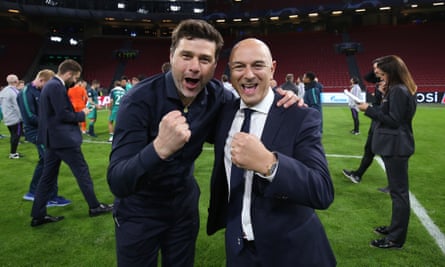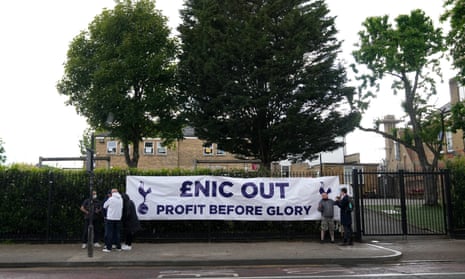Like the proverbial tree falling in the forest, or the sound of no hands clapping, the prospect of Antonio Conte not joining Tottenham Hotspur has a certain paradoxical quality to it. Conte joining Tottenham: on some level, I suspect we all knew how this would pan out. The initial fire-streak of success; a brief title challenge; the inevitable implosion and acrimonious divorce, leaving only bittersweet memories and a squad packed with unshiftable 29-year-old wing-backs.
But Conte not joining: somehow this feels meaningful and epic in itself, a mini-tale of clashing egos and competing ambitions and insecurity and longing all packed into a week-long heavily briefed news cycle. And for all the disputed details of their courtship – are we really to believe Tottenham pulled the plug on one of the world’s best coaches out of concern for the development of Oliver Skipp? – there is a sense that even this apparent nonevent has subtly wrinkled the fabric of the universe.
Conte, of course, will be fine. Though he may be short of options right now, he has successfully positioned himself as the gold-embossed, club-class option for the next ailing super-club with a trophy drought and a Nasa-sized transfer budget. The sabre-rattling, the lavish demands, the fixation on instant success: for his part the last couple of weeks have just been a brand-burnishing exercise, a reminder to oligarchs the world over that the Conte luxury marque is still in business.
The more interesting question, really, is where this leaves Tottenham. Almost two months after José Mourinho was sacked Daniel Levy is still searching for his replacement. The chairman’s preferred option, Julian Nagelsmann, went to Bayern Munich. Hansi Flick took the German national job. Brendan Rodgers seems quite happy at Leicester for now. An eye-catching flirtation with Mauricio Pochettino appears to have come to nothing. In the midst of which, and seemingly at random, a new director of football (Fabio Paratici) has been hired from Juventus.
Now Conte has also spurned their advances, any prospective new manager will know that he or she is – at best – fifth choice. And, more tellingly, that Levy’s stated commitment to “free-flowing, attacking football” and youth development extends only as far as the next superstar coach who makes eyes at him. In many ways this is the tension that has defined the modern Tottenham: a club eternally caught between long-term processes and short-term obsessions, a team that for all its moderate success on the pitch still has no real idea what it wants to be.

Levy is the common denominator here, the common signature at the bottom of two decades of eclectic, reflex managerial hires. Mourinho’s confrontational pragmatism was a reaction to the inclusive idealism of Pochettino, which was a reaction to the British bluntness of Tim Sherwood, which was a reaction to the gnomic intellectualism of André Villas-Boas, which was a reaction to the homespun wisdom of Harry Redknapp, which was a reaction to the continental technocracy of Juande Ramos, and so on. Even the current farce has its own precedent from 2003-04, when the promised “thorough search” for Glenn Hoddle’s replacement – with names such as Vicente del Bosque, Klaus Toppmöller and Martin O’Neill all mooted – ended in the caretaker manager, David Pleat, remaining in charge for nine months.
Clearly Levy has a fine instinct for commerce. And yet in any normal business there would be some sort of reckoning for the serial errors that have occurred on his watch: a hierarchy to answer to, consequences to confront. Even the much-maligned Ed Woodward at Manchester United has to face the shareholders every few months. Levy, by contrast, operates a small circle of loyal nodding dogs, with an absentee owner in Joe Lewis who may as well be propped up by pillows and sticks. With fans locked out and largely ignored in any case, Levy basically has untrammelled power to keep messing up and getting away with it. How curious that the ninth richest club in the world has somehow ended in a position where the major footballing decisions are being taken by a guy who – with the greatest of respect – does not really seem to know that much about football. This much is evident from the club’s Amazon documentary, in which the normally reclusive Levy is clearly at pains to present himself as some superior footballing intellect, only to come across as the bloke who sits next to you on a plane and tells you about how he won the Champions League with Bolton on Football Manager.
And so the search goes on: led by Levy, assisted by Paratici or perhaps by Steve Hitchen, the head of recruitment who has just been demoted by Paratici’s arrival. Meanwhile Harry Kane drifts towards the exit, Son Heung-min will turn 29 without a club trophy to his name, Érik Lamela still collects a weekly wage and the under-23s lost 6-1 to Manchester City last month.
Is there a theme to any of this? Maybe caprice and human error: the inevitable product of tying your club’s fate to one man’s vanity. Together with the doomed European Super League, it is hard not to see Tottenham’s pursuit of Conte as their last shot at leveraging whatever remained of their Big Club status.
The pandemic has bitten hard; the stadium still needs paying for. And whether it is Erik ten Hag or Graham Potter or Roberto Martínez at the helm, Tottenham’s world feels just a little smaller this week, a little darker, a little less hopeful. A bright new dawn that turned out to be another illusion: insofar as the modern Tottenham does have an identity, this might just be it.

